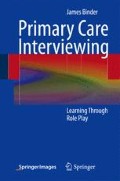Abstract
The following basic skills are prerequisites to role-playing giving bad news: attending , listening , eliciting feelings, checking patient’s theory of illness , monitoring pace, empathic summary , feeling responses , and self-awareness .
Access this chapter
Tax calculation will be finalised at checkout
Purchases are for personal use only
References
Binder J. Pediatric Interviewing: a practical, relationship-based approach. New York, NY: Humana Press; 2010.
Fallowfield L. Giving sad and bad news. Lancet. 1993;341:476–8.
Remen RN. Kitchen table wisdom. New York, NY: Riverhead Books; 1997.
Neimeyer R. Lessons of loss: a guide to coping. Memphis, TN: Center for the Study of Loss and Transition; 2006.
Beck JS. Cognitive therapy: basics and beyond. New York, NY: The Guilford Press; 1995.
Harris A. Good guys and sweethearts. Trans Anal J III. 1972;1:13–9.
Goulding MM. Childhood scenes. In: Lennox CE, editor. Redecision therapy: a brief, action-oriented approach. Northvale, NJ: Jason Aronson; 1997.
Girgis A, Sanson-Fisher RW. Breaking bad news: consensus guidelines for medical practitioners. J Clin Oncol. 1995;13:2449–56.
Korsch BM, Aley EF. Pediatric interviewing techniques: current pediatric therapy. Sci Am. 1973;3:1–42.
Buckman R. How to break bad news: a guide for the health care professional. Baltimore, MD: John Hopkins University Press; 1992.
Platt FW, Gordon GH. Field guide to the difficult patient interview. 2nd ed. Philadelphia, PA: Lippincott Williams and Wilkins; 2004.
Marcin JP, Pollack MM, Kuntilal MP, Sprague BM, Ruttimann UE. Prognostication and certainty in the pediatric intensive care unit. Pediatrics. 1999;104:868–73.
Coulehan JL, Block MR. The medical interview: mastering skills for clinical practice. 5th ed. Philadelphia, PA: FA Davis; 2006.
Pollak KI, Arnold RM, Jeffreys AS, Alexander SC, Olsen MK, Abernethy AP, et al. Oncologist communication about emotions during visits with patients with advanced cancer. J Clin Oncol. 2007;25:5748–52.
Author information
Authors and Affiliations
Rights and permissions
Copyright information
© 2013 Springer Science+Business Media New York
About this chapter
Cite this chapter
Binder, J. (2013). Giving Bad News. In: Primary Care Interviewing. Springer, New York, NY. https://doi.org/10.1007/978-1-4614-7224-7_19
Download citation
DOI: https://doi.org/10.1007/978-1-4614-7224-7_19
Published:
Publisher Name: Springer, New York, NY
Print ISBN: 978-1-4614-7223-0
Online ISBN: 978-1-4614-7224-7
eBook Packages: MedicineMedicine (R0)

